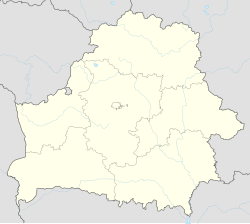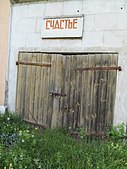Village in Brest Region, Belarus
This article has multiple issues. Please help
improve it or discuss these issues on the
talk page. (
Learn how and when to remove these template messages)
This article needs additional citations for
verification. Please help
improve this article by
adding citations to reliable sources. Unsourced material may be challenged and removed.Find sources:
"Molchad" –
news ·
newspapers ·
books ·
scholar ·
JSTOR (February 2016) (
Learn how and when to remove this message)
.mw-parser-output .hidden-begin{box-sizing:border-box;width:100%;padding:5px;border:none;font-size:95%}.mw-parser-output .hidden-title{font-weight:bold;line-height:1.6;text-align:left}.mw-parser-output .hidden-content{text-align:left}@media all and (max-width:500px){.mw-parser-output .hidden-begin{width:auto!important;clear:none!important;float:none!important))You can help expand this article with text translated from
the corresponding article in Belarusian. (February 2016) Click [show] for important translation instructions.
Machine translation, like
DeepL or
Google Translate, is a useful starting point for translations, but translators must revise errors as necessary and confirm that the translation is accurate, rather than simply copy-pasting machine-translated text into the English Wikipedia.
Do not translate text that appears unreliable or low-quality. If possible, verify the text with references provided in the foreign-language article.
You must provide
copyright attribution in the
edit summary accompanying your translation by providing an
interlanguage link to the source of your translation. A model attribution edit summary is Content in this edit is translated from the existing Belarusian Wikipedia article at [[:be:Моўчадзь (вёска)]]; see its history for attribution.
You may also add the template ((Translated|be|Моўчадзь (вёска))) to the
talk page.
For more guidance, see
Wikipedia:Translation.
You can help expand this article with text translated from
the corresponding article in Belarusian. (February 2016) Click [show] for important translation instructions.
Machine translation, like
DeepL or
Google Translate, is a useful starting point for translations, but translators must revise errors as necessary and confirm that the translation is accurate, rather than simply copy-pasting machine-translated text into the English Wikipedia.
Do not translate text that appears unreliable or low-quality. If possible, verify the text with references provided in the foreign-language article.
You must provide
copyright attribution in the
edit summary accompanying your translation by providing an
interlanguage link to the source of your translation. A model attribution edit summary is Content in this edit is translated from the existing Belarusian Wikipedia article at [[:be:Моўчадзь (вёска)]]; see its history for attribution.
You may also add the template ((Translated|be|Моўчадзь (вёска))) to the
talk page.
For more guidance, see
Wikipedia:Translation.
(
Learn how and when to remove this message)
Village in Brest Region, Belarus
Molchad or Mowchadz (Belarusian: Моўчадзь, romanized: Moŭčadź; Russian: Молчадь; Polish: Mołczadź; Yiddish: מייטשעט, romanized: Meytshet) is a village in Baranavichy District, Brest Region, Belarus. It is situated on the Molchad River and 33 kilometres (21 mi) north-west from Baranavichy. In 2005, the population of Molchad was 950 and included 330 households.
History
The village of Molchad has appeared in written sources as early as 1486 with the founding of the local Holy Trinity Church, which no longer stands,[1] listed as part of the Slonim povet of the Grand Duchy of Lithuania.[1]
During the Russo-Polish War in 1654 the village was razed by Russian invaders but later rebuilt.
Under the Russian Empire
As a result of the third partition of Poland in 1795 Molchad became part of the Russian Empire.
In 1879, the village suffered a large fire which destroyed most of its buildings.
In 1880, the St. Peter and Paul Church was completed.[1]
In 1884 a railway was built through the village connecting it to the nearby city of Brest.
In 1886 Molchad was reported to have 2 churches, 3 synagogues, a brewery, a railway station, a school and a bazaar.[1]
20th century
In 1921, the Peace of Riga transferred Molchad to Poland.
Following the Invasion of Poland in 1939, Molchad was incorporated into the Byelorussian SSR.
Between June 1941 and July 1944, Molchad was occupied by Nazi Germany and a ghetto was established there. From June through August 1942, 3,600 Jews from Molchad and the surrounding area were massacred by the native Polish population with the support of German troops. Many Jews were buried alive.[2][3]







